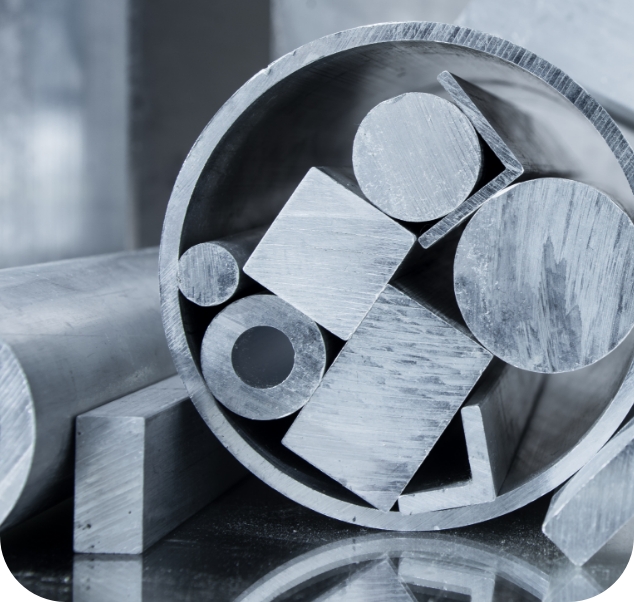Nuclear Power Applications
Materials for nuclear power plants include Zircaloy alloys for reactors and reactor vessels, various materials for steam generators, turbines, heat exchangers and piping, plus Boron enriched stainless steel materials for radiation shielding, and B4C pellets for B10 concentration. Materials must retain their function, strength and toughness under bombardment by neutrons and gamma radiation.
For example, steels in nuclear power plants can be damaged when high-energy neutrons displace metal atoms from their normal position in the microstructure, leaving defects in the steel. In other cases, the atoms themselves can absorb neutrons. This can result in the creation of helium or hydrogen within the microstructure, causing the irradiated component to swell, reducing its resistance to fracture.
However, development and testing of advanced steels have shown that, for example, manganese-molybdenum-nickel ferritic steels can resist such damage in applications such as pressure vessels. These steels must be quenched and tempered to produce a defined microstructure.
Iron-based amorphous metal formulations with chromium, molybdenum, and tungsten have shown that they can provide the corrosion resistance believed to be necessary for such applications. Rare earth additions enable very low critical cooling rates to be achieved.
The boron content of these materials, and their stability at high neutron doses, enable them to serve as high efficiency neutron absorbers for criticality control. Ceramic coatings may provide even greater corrosion resistance for container applications.
Therefore, reliable operation of nuclear plant components demands certainty of alloy chemistry, assurance that materials are defect-free, and confidence in alloy strength, fracture toughness, and resistance to fatigue, corrosion, and stress corrosion cracking.
One of NSL Analytical’s most important responsibilities is to evaluate several nuclear plant materials such as stainless steels, superalloys, and alloys of titanium, nickel, zirconium, B4C, and tungsten. Our experienced staff, advanced analysis instrumentations, and metallographic analysis capabilities can assure operators of nuclear power plants that their materials of construction will function as designed and that commercially available material can meet the requirements to be used at a nuclear site.
Besides safety related items, we also analyze commercially dedicated items such as mechanical lubricants, polymeric materials, computer keyboards, ball point pens, rubber gloves, etc. specifically used in nuclear facilities to ensure that they meet the testing requirements.
Nuclear Power Materials Testing Services
NSL performs a variety of testing services for the Nuclear Industry, including the following:
Mechanical and Physical Testing
- Tensile Testing (Elevated and Room Temperature)
- Bend Tests
- Hardness Testing (Brinell, Rockwell)
- Charpy Impact Test
- Weld Testing
- Heat Treat
Chemical Analysis
- Carbon, Hydrogen, Nitrogen, Oxygen and Sulfur determination
- Classical Wet Chemistry
- FTIR Spectroscopy
- SEM/EDX
- Spectroscopy (ICP, ICP-MS, Spark-AES)
- X-Ray Florescence Spectrograph (XRF)
Metallography
- Alpha Case
- Case Depth Measurement
- Coating and Plating Thickness
- Ferrite Content
- Grain Flow and Grain Size
- Heat Treat Condition
- Inclusion Rating
- Intergranular Corrosion (IGC) or Attack (IGA)
- Macrostructure
- Material Defects
- Plasma Spray Coating
- Microstructure
- Microhardness by Knoop and Vickers
- Porosity
- Surface Contamination
- Surface Evaluation
Nonmetallic Testing
- Analysis for identification of plastics, rubber, fillers, additives and contaminants.
- Material Properties
- Material Composition such as B10 Isotope concentration
If you do not see a particular service listed above, contact us today to learn more about our nuclear power materials testing services.
Accreditations & Approvals for Nuclear Power Industry
NSL’s materials testing facilities maintain:
- ASME NQA-1-2008 with 2009 Addendum compliance
(Visit our NQA-1 FAQ for more information)
- ISO/IEC 17025 accreditation by ANAB
- 10 CRF Part 21 reporting program
- 10 CRF 50 Appendix B compliance
NSL’s quality system has been audited and approved by:
- NIAC (Nuclear Industry Assessment Committee)
- NUPIC (Nuclear Procurement Issues Committee)



